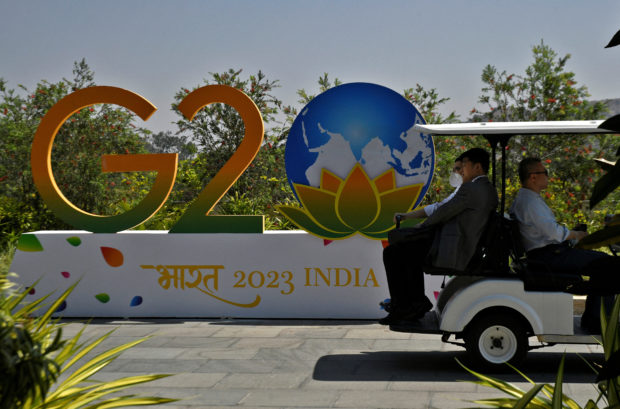
Delegates ride in a buggy at G20 finance officials meeting venue near Bengaluru, India, Feb 22, 2023. REUTERS/Samuel Rajkumar/File photo
BENGALURU – Indian Prime Minister Narendra Modi urged global financial leaders to focus on the world’s “most vulnerable citizens” as he inaugurated a G20 meeting on Friday, the first anniversary of Russia’s invasion of Ukraine.
The Indian leader made direct no mention of the war in his address to G20 finance ministers and central bank governors at the Nandi Hills resort on the outskirts of Bengaluru, although the conflict and its effect on the world are likely to dominate the two-day meeting.
Modi said the COVID-19 pandemic and “rising geo-political tensions in different parts of the world” had led to unsustainable debt levels in several countries, disruptions to global supply chains and threats to food and energy security.
“I would urge that your discussions should focus on the most vulnerable citizens of the world,” he said, adding that stability, confidence and growth had to be brought back to the world economy.
Participants at the meeting, however, are likely to focus on the war in Ukraine. The G20 bloc includes the wealthy G7 democracies, as well as Russia, China, India, Brazil and Saudi Arabia.
French Finance Minister Bruno Le Maire told Reuters that G20 financial leaders must condemn Russia’s aggression against Ukraine and that Europe was working on new sanctions against Moscow.
U.S. Treasury Secretary Janet Yellen and fellow G7 ministers called on Thursday for more financial support for Ukraine and vowed to maintain tough sanctions on Russia.
G7 chair Japan’s finance minister, Sunichi Suzuki, told reporters that the group would closely monitor the effectiveness of sanctions and “take further actions as needed”.
German Finance Minister Christian Lindner said the pressure on Russia must be kept high to “completely isolate” Russia’s economy.
India, which holds the current G20 presidency, does not want the bloc to discuss additional sanctions on Russia and is also pressing to avoid using the word “war” in G20 communique language to describe the conflict, G20 officials told Reuters.
New Delhi has maintained a neutral stance on the conflict, vastly increasing its purchases of cheaper Russian oil. Russia calls its actions in Ukraine a “special military operation”.
Yellen said the communique was still under discussion and she hoped to see a strong condemnation of Russia’s invasion and the damage it has caused Ukraine and the global economy.
Global economy improves
The meeting comes amid signs that the global outlook has improved from the last G20 summit in October, when a number of economies were teetering on the brink of recession amid energy and food price spikes caused by the war.
Yellen highlighted the improvement, saying the global economy “is in a better place today than many predicted just a few months ago”.
The International Monetary Fund has forecast global GDP growth for 2023 at 2.9 percent, up from a 2.7 percent forecast in October, but still well below the 3.4 percent achieved in 2022.
Yellen attributed the improvement in part to cooperation among G20 central banks and governments over the past year in taking strong action to quell inflation, even at the expense of growth.
Inflation in the United States and other countries has eased alongside lower energy prices, but Yellen added that such efforts needed to continue and more work was needed to mitigate spillovers from the war, such as easing food shortages and holding down energy prices and Russian revenues.

